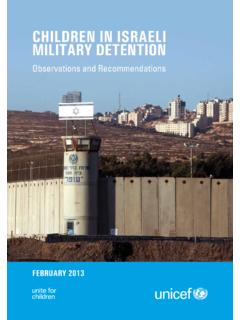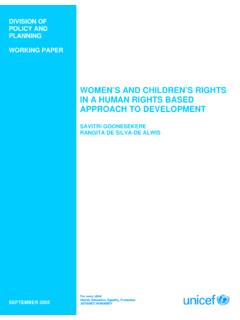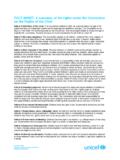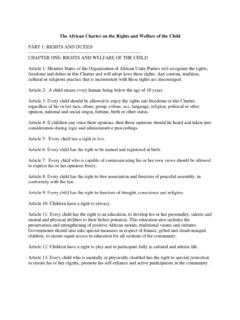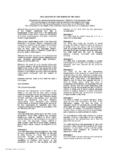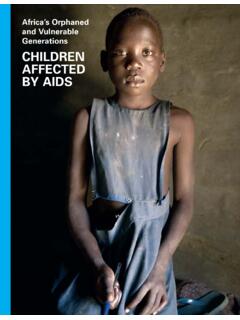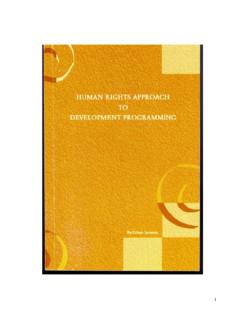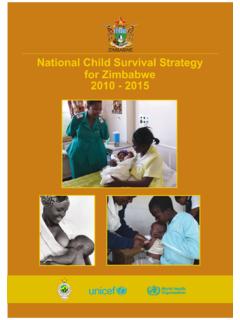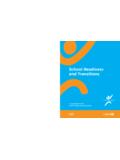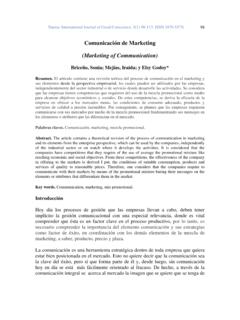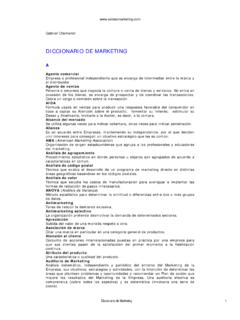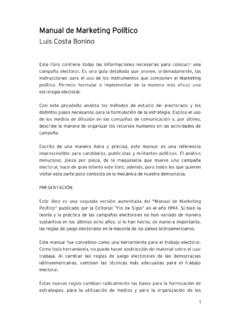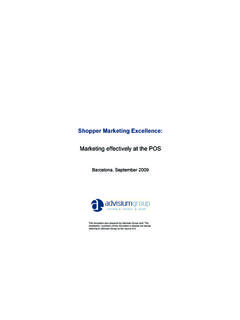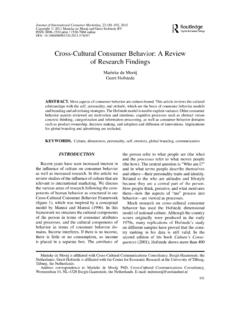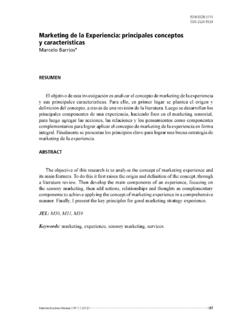Transcription of International Code of Marketing of Breast-milk …
1 International code of Marketing ofBreast-milk SubstitutesWorld Health OrganizationGeneva19812 ISBN 92 4 154160 1 World Health Organization 1981 Publications of the World Health Organization enjoy copyright protection in accordance withthe provisions of Protocol 2 of the Universal Copyright Convention. For rights of reproduction ortranslation of WHO publications, in part or in toto, application should be made to the Office ofPublications, World Health Organization, Geneva, Switzerland. The World Health Organizationwelcomes such designations employed and the presentation of the material in this publication do notimply the expression of any opinion whatsoever on the part of the Secretariat of the World HealthOrganization concerning the legal status of any country, territory, city of area or of its authorities.
2 Orconcerning the delimitation of its frontiers or code of Marketing of Breast-milk SubstitutesAnnex of the Executive Board at its sixty-seventh session and ofthe Thirty-fourth World Health Assembly on the on the InternationalCode of Marketing of Breast-milk Substitutes Annex of the Thirty-third World Health Assembly on infant andyoung child feeding Annex from the introductory statement by the Representative of theExecutive Board to the Thirty-fourth World Health Assembly on thesubject of the draft International code of Marketing of breast-milksubstitutes 4 IntroductionTHE WORLD HEALTH ORGANIZATION (WHO) and the United NationsChildren's Fund (UNICEF) have for many years emphasized the importance ofmaintaining the practice of breast-feeding and of reviving the practice where it is indecline as a way to improve the health and nutrition of infants and young to promote breast-feeding and to overcome problems that might discourage itare a part of the overall nutrition and maternal and child health programmes of bothorganizations and are a key element of primary health care as a means of achievinghealth for all by the year variety of factors influence the prevalence and duration of breast-feeding.
3 The Twenty-seventh World Health Assembly, in 1974, noted the general decline inbreast-feeding in many parts of the world, related to sociocultural and other factorsincluding the promotion of manufactured Breast-milk substitutes, and urged "Membercountries to review sales promotion activities on baby foods to introduce appropriateremedial measures, including advertisement codes and legislation where necessary".1 The issue was taken up again by the Thirty-first World Health Assembly inMay 1978. Among its recommendations were that Member States should givepriority to preventing malnutrition in infants and young children by, inter alia,supporting and promoting breast-feeding, taking legislative and social action tofacilitate breast-feeding by working mothers, and "regulating inappropriate salespromotion of infant foods that can be used to replace breast milk".
4 2 Interest in the problems connected with infant and young child feeding andemphasis on the importance of breast-feeding in helping to overcome them have, ofcourse, extended well beyond WHO and UNICEF. Governments, nongovernmentalorganizations, professional associations, scientists, and manufacturers of infant foodshave also called for action to be taken on a world scale as one step towards improvingthe health of infants and young the latter part of 1978,WHO and UNICEF announced their intention oforganizing jointly a meeting on infant and young child feeding, within their existingprogrammes, to try to make the most effective use of this groundswell of opinion. After thorough consideration on how to ensure the fullest participation, the meetingwas convened in Geneva from 9 to 12 October 1979 and was attended by some 150representatives of governments, organizations of the United Nations system and otherintergovernmental bodies, nongovernmental organizations, the infant-food industry,and experts in related disciplines.
5 The discussions were organized on five mainthemes: the encouragement and support of breast-feeding; the promotion and supportof appropriate and timely complementary feeding (weaning) practices with the use of 1 Resolution (Handbook of Resolutions and Decisions of the World Health Assembly andthe Executive Board, Volume II, 4th ed., Geneva, 1981, ).2 Resolution (Handbook of Resolutions and Volume II, 4th ed., ).5local food resources; the strengthening of education, training and information oninfant and young child feeding; the promotion of the health and social status ofwomen in relation to infant and young child health and feeding; and the appropriatemarketing and distribution of Breast-milk Thirty-third World Health Assembly, in May 1980, endorsed in theirentirety the statement and recommendations agreed by consensus at this jointWHO/UNICEF meeting and made particular mention of the recommendation that"there should be an International code of Marketing of infant formula and otherproducts used as Breast-milk substitutes", requesting the Director-General to preparesuch a code "in close consultation with Member States and with all other partiesconcerned".
6 3To develop an International code of Marketing of Breast-milk substitutes inaccordance with the Health Assembly's request, numerous and lengthy consultationswere held with all interested parties. Member States of the World HealthOrganization and groups and individuals who had been represented at the October1979 meeting were requested to comment on successive drafts of the code , andfurther meetings were held in February and March and again in August andSeptember in 1980. WHO and UNICEF placed themselves at the disposal of allgroups in an effort to foster a continuing dialogue on both the form and the content ofthe draft code and to maintain as a basic minimum content those points which hadbeen agreed upon by consensus at the meeting in October January 1981, the Executive Board of the World Health Organization at itssixty-seventh session, considered the fourth draft of the code , endorsed it, andunanimously recommended4 to the Thirty-fourth World Health Assembly the text of aresolution by which it would adopt the code in the form of a recommendation ratherthan as a In May 1981, the Health Assembly debated the issue after ithad been introduced by the representative of the Executive It adopted thecode, as proposed.
7 On 21 May by 118 votes in favour to 1 against, with 3 3 See resolution , reproduced in Annex See resolution , reproduced in Annex The legal implications of the adoption of the code as a recommendation or as a regulation arediscussed in a report on the code by the Director-General of WHO to the Thirty-fourth World HealthAssembly; this report is contained in document WHA34/1981/REC/1, Annex 3. 6 See Annex 3 for excerpts from the introductory statement by the representative of the See Annex 1 for the text of resolution , by which the code was adopted. For theverbatim record of the discussion at the fifteenth plenary meeting, on 21 May 1981, see documentWHA34/1981/ Member States of the World Health Organization:Affirming the right of every child and every pregnant and lactating woman tobe adequately nourished, as a means of attaining and maintaining health;Recognizing that infant malnutrition is part of the wider problems of lack ofeducation, poverty, and social injustice;Recognizing that the health of infants and young children cannot be isolatedfrom the health and nutrition of women, their socioeconomic status and their roles asmothers;Conscious that breast-feeding is an unequalled way of providing ideal food forthe healthy growth and development of infants; that it forms a unique biological andemotional basis for the health of both mother and child.
8 That the anti-infectiveproperties of Breast-milk help to protect infants against disease; and that there is animportant relationship between breast-feeding and child-spacing;Recognizing that the encouragement and protection of breast-feeding is animportant part of the health, nutrition and other social measures required to promotehealthy growth and development of infants and young children; and that breast-feeding is an important aspect of primary health care;Considering that, when mothers do not breast-feed, or only do so partially,there is a legitimate market for infant formula and for suitable ingredients from whichto prepare it; that all these products should accordingly be made accessible to thosewho need them through commercial or non-commercial distribution systems; and thatthey should not be marketed or distributed in ways that may interfere with theprotection and promotion of breast-feeding;Recognizing further that inappropriate feeding practices lead to infantmalnutrition, morbidity and mortality in all countries, and that improper practices inthe Marketing of Breast-milk substitutes and related products can contribute to thesemajor public health problems;Convinced that it is important for infants to receive appropriatecomplementary foods, usually when they reach four to six months of age, and thatevery effort should be made to use locally available foods; and convinced,nevertheless, that such complementary foods should not be used as breast-milksubstitutes.
9 Appreciating that there are a number of social and economic factors affectingbreast-feeding, and that, accordingly, governments should develop social supportsystems to protect, facilitate and encourage it, and that they should create anenvironment that fosters breast-feeding, provides appropriate family and communitysupport, and protects mothers from factors that inhibit breast-feeding;Affirming that health care systems, and the health professionals and otherhealth workers serving in them, have an essential role to play in guiding infant7feeding practices, encouraging and facilitating breast-feeding, and providing objectiveand consistent advice to mothers and families about the superior value of breast-feeding, or, where needed, on the proper use of infant formula, whether manufacturedindustrially or home-prepared;Affirming further that educational systems and other social services should beinvolved in the protection and promotion of breastfeeding, and in the appropriate useof complementary foods.
10 Aware that families, communities, women's organizations and othernongovernmental organizations have a special role to play in the protection andpromotion of breast-feeding and in ensuring the support needed by pregnant womenand mothers of infants and young children, whether breast-feeding or not;Affirming the need for governments, organizations of the United Nationssystem, nongovernmental organizations, experts in various related disciplines,consumer groups and industry to cooperate in activities aimed at the improvement ofmaternal, infant and young child health and nutrition;Recognizing that governments should undertake a variety of health, nutritionand other social measures to promote healthy growth and development of infants andyoung children, and that this code concerns only one aspect of these measures;Considering that manufacturers and distributors of Breast-milk substitutes havean important and constructive role to play in relation to infant feeding, and in thepromotion of the aim of this code and its proper implementation;Affirming that governments are called upon to take action appropriate to theirsocial and legislative framework and their overall development objectives to giveeffect to the principles and aim of this code , including the enactment of legislation,regulations or other suitable measures.
